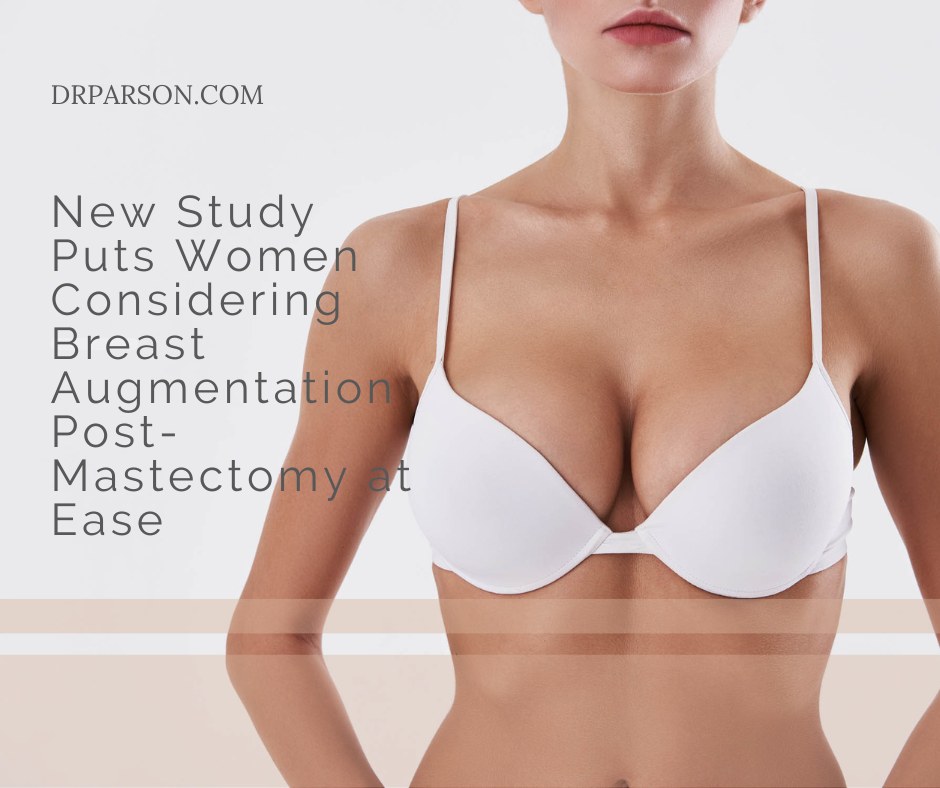
13 Feb New Study Puts Women Considering Breast Augmentation Post-Mastectomy at Ease
In recent years, many women who were considering breast augmentation (breast implants) put their decision on hold thanks to fear-mongering headlines that allegedly linked implants with a certain type of cancer. If you fall into that category, updated studies should put your mind at ease. In reality, the risk of developing a very rare type of cancer—anaplastic large-cell lymphoma (ALCL)—is also quite rare. The association between “breast implants” and ALCL has actually always referred to a very specific type of implant, out of the many to choose from. At Dr. Shaun Parson Plastic Surgery & Skin Center, we exclusively work with the safest, most proven materials and technologies for all procedures, including breast implants. There is silicone and saline, and within those two options exist a myriad of different makeups of materials from different manufacturers. According to a new study from Columbia University, the growing popularity of texture-based implants may be why there are even fewer incidents of ALCL when it comes to breast augmentation.
Textured implants, rather than smooth implants, can be made of silicone or saline but are typically part of the silicone family. There are many reasons they are in higher demand, but one of them is that they “stick” the implants in place. Scar tissue will develop between any implant and surrounding tissue, which is not troublesome, but this occurs faster and “stickier” with textured implants. This can help them stay in place, which is especially beneficial for those who opt for a teardrop-shaped implant. This shape is more popular than round these days since it better mimics natural breasts, and textured implants help to ensure less rotation. When round implants rotate slightly, there is no issue. However, you definitely want a teardrop implant to stay in place.
Cancer Realities with Implants
Breast implants are the only way to increase the size and volume of the breasts—which is very important for many post-mastectomy patients. The Columbia study exclusively looked at patients who had their breasts removed as part of a cancer treatment and discovered that the odds of developing ALCL after reconstructive breast surgery is “extremely low.” In fact, just 12 incidents per every 1 million surgeries were found. According to the lead author, “The risk of developing ALCL is actually much lower than the risk of experiencing a relapse of breast cancer.” Although the researchers did not analyze women who got breast implants without previously having a mastectomy, this is great news for anyone considering the surgery.
Further, the researchers state that “Based on our findings, we do not believe that women should be dissuaded from having implant-based breast reconstruction after mastectomy solely due to the risk of ALCL.” The goal of the study was to give women post-mastectomy correct information about any risks by looking at the real rates of ALCL survivors. To do this, they used a national cancer registry to find 57,000 women who got breast implants after a mastectomy. These women of course opted for various types of implants—including textured. All women underwent surgery between 2000 – 2018. The follow-up period was seven years, with 16,000 of the women followed by researchers for a minimum of 10 years.
Breast Implant Facts and Figures
The researchers did find that those who got implants post-mastectomy had a slightly higher risk of developing ALCL compared to women who did not get implants. Still, the lead author stresses that “it should be noted that ALCL is a rare cancer … among 57,000 women in the study, only five cases of ALCL were diagnosed over the combined 421,000 years of follow-up.” Understandably, anyone who has already had cancer (breast cancer) is going to be hyper-wary of developing another. “But that shouldn’t necessarily put them off from having reconstructive implants,” says the authors. “For many women, breast reconstruction after mastectomy is extremely important to quality of life, and women should feel comfortable going ahead with implants without adding to the psychological burdens that come with a breast cancer diagnosis.”
The authors did not study any inherent correlation between breast cancer and ALCL, and there were no conflicts of interest in the studies. If you are a woman considering breast augmentation, understanding all benefits and potential risks is an early part of your journey and should be discussed with a leading expert. To schedule your consultation for breast augmentation with Dr. Parson, contact Dr. Shaun Parson Plastic Surgery & Skin Center today by calling the office.
